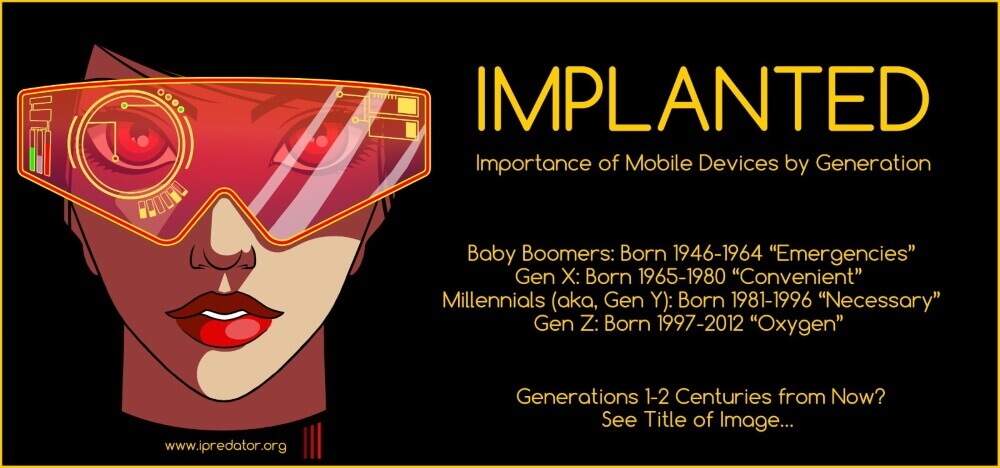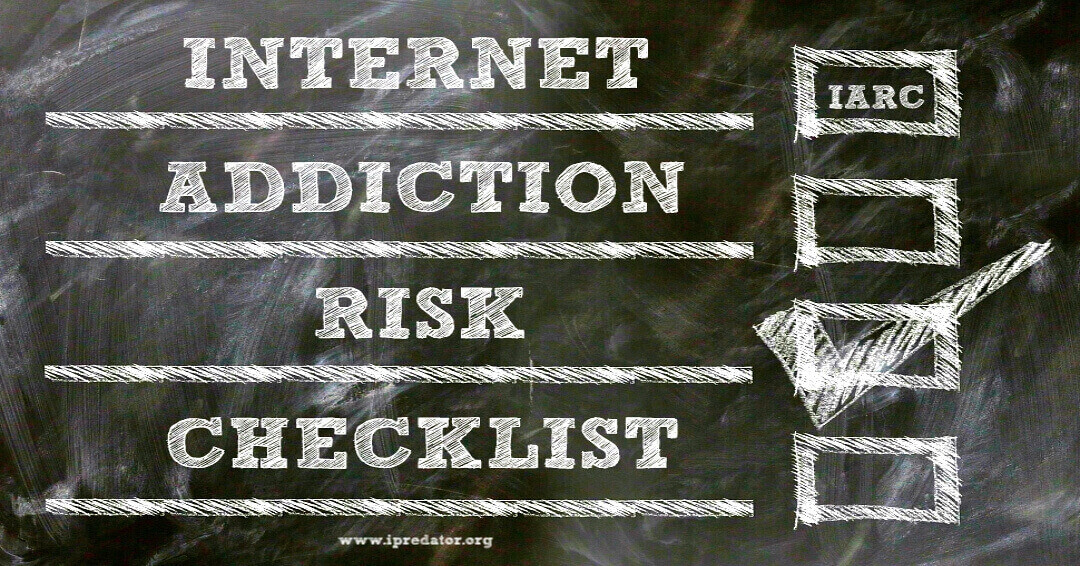
Internet Addiction Risk Checklist (IARC)
by
Michael Nuccitelli, Psy.D.
Internet Addiction Risk Checklist (IARC): The Internet Addiction Risk Checklist (IARC) is a 100- item risk assessment designed to investigate if an Information and Communications Technology (ICT) user is engaging in pathological use of the internet and ICT. The checklist statements have been categorized into cognitive, affective, behavioral and perceptual sections all themed surrounding the compulsive dependent use of digital devices. The IARC can be taken as a self-assessment and when assessing others. Although the IARC is a general assessment for pathological ICT usage, supplement items have been added to focus on the areas of Cyber Sex, Cyber Relationship, Gaming & Online Commerce, Information Implosion & Dark Side ICT usage.
Internet Abuse
Internet Abuse: Internet Abuse (aka Internet Addiction & Internet Use Gaming Disorder) is an umbrella concept defining a child or adult’s compulsive and progressive abuse of the internet and electronic devices designed to obtain, exchange or disseminate information. Although the internet is the predominate arena in which Internet Abuse takes place, electronic devices and communications channels not internet enabled are also included in the definition.
Internet Abuse causes dysfunctional cognitive, affective, behavioral & perceptual intrapersonal consequences accompanied with employment, academic, familial, peer & intimate partner interpersonal consequences. On a continuum of severity, ranging from absent to mild, cessation of Internet and/or electronic device usage causes withdrawal symptomatology, psychological and/or physiological, combined with perceptual tolerance. Also, on a continuum of severity, Internet Abusive online users engage in criminal, deviant and/or deceptive online activities ranging from absent to severe.
The chronic and more debilitating condition, Internet Dependence, is more chronic, severe and self-destructive. Internet Abuse is segmented into six typologies as follows: Cyber Sex Fixated, Cyber Relationship Fixated, Internet Gaming & Online Commerce Fixated, Information Implosion Fixated, Dark Side Fixated and NOS (Not Otherwise Specified) Fixated. The NOS Fixated typology applies to internet abusing online users who share more than one typology, has a co-existing mental illness or medical condition causing psychiatric dysfunction.

Internet Dependence
Internet Dependence: Internet Dependence (aka Internet Addiction & Internet Use Gaming Disorder) is an umbrella concept defining a child or adult’s compulsive and progressive dependency upon the internet and electronic devices designed to obtain, exchange or disseminate information. Although the internet is the predominate arena in which Internet Dependence takes place, electronic devices and communications channels not internet enabled are also included in the definition. Internet Dependence causes dysfunctional cognitive, affective, behavioral & perceptual intrapersonal consequences accompanied with employment, academic, familial, peer & intimate partner interpersonal consequences.
On a continuum of severity, ranging from mild to severe, cessation of Internet and/or electronic device usage causes withdrawal symptomatology, psychological and/or physiological, combined with perceptual tolerance. Also, on a continuum of severity, Internet Dependent online users engage in criminal, deviant and/or deceptive online activities ranging from mild to severe.
The mild and less debilitating condition, Internet Abuse, is not as chronic, severe or self- destructive. Internet Dependence is segmented into six typologies as follows: Cyber Sex Fixated, Cyber Relationship Fixated, Internet Gaming & Online Commerce Fixated, Information Implosion Fixated, Dark Side Fixated and NOS (Not Otherwise Specified) Fixated. The NOS Fixated typology applies to internet dependent online users who share more than one typology, has a co-existing mental illness or medical condition causing psychiatric dysfunction.
Note: Responding “Yes, I Agree, True” to any of the statements provided in the IARC does not confirm you or the person being queried meets a formal definition of Internet Addiction or Internet Use Disorder (IUD.) In fact, as of May 2013, there is no widely accepted formal definition of Internet Addiction or a widely accepted clinically validated set of diagnostic criteria. The purpose of the IARC is to be used as a screening tool, data collection technique and educational blueprint. The correct responses to each of the IARC items should be “No, I Disagree, False.”
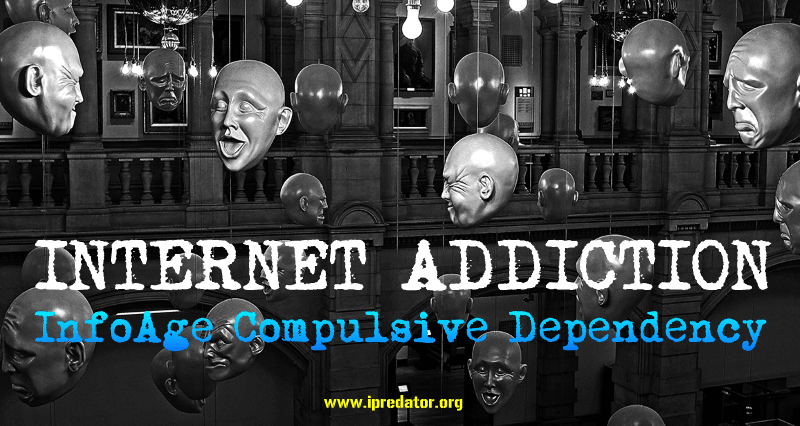
IARC ITEM DEFINITIONS
I. ICT: The acronym, ICT, stands for Information and Communications Technology. Information is an umbrella term representing all forms of telecommunication, information technology, broadcast media, audio and video processing, transmission, the internet and non-internet enabled electronic devices.
II. Habitual: The term “habitual” is a qualitative word representing frequent usage of ICT. The term “habitual,” being a qualitative term, means that the IARC respondent may have varying interpretations of what frequent usage of ICT means. For purposes of the IARC, the definition of the term “habitual” is defined as “a fixed pattern,” “daily routine” or “persistent” behavior(s). It should be noted that the term does not imply a physical dependence upon the internet but represents a routine behavior that may or may not be perceived by the subject as compulsive.
As stated above, responding “Yes, I Agree, True” to any of the statements does not confirm you or the person being queried meets a formal definition of Internet Addiction or a widely accepted clinically validated set of diagnostic criteria. However, affirmative responses to ten or more of the statements are a strong indicator that you or the person being queried may be suffering from an Internet Addiction (aka Internet Use Disorder.)
Checklist Directions
Internet Addiction Risk Checklist (IARC)
1. To complete the checklist, you are required to respond to each statement with 1 of 4 choices as follows:
- A. Y__ (Yes, Agree, True)
- B. N__ (No, Disagree, False)
- C. IDK__ (I Do Not Know, I Did Not Know, I Am Unsure)
- D. DNA__ (Does Not Apply, Not Applicable, Not Relevant)
3. Only answer “Yes” or “No” to statements you are positive about or almost certain in your decision with minimal doubt.
4. If there is a statement you do not understand, respond with choice D. DNA__ (Does Not Apply, Not Applicable, Not Relevant)
5. If there is a statement that does not apply to you or the subject being queried, respond with choice D. DNA__ (Does Not Apply, Not Applicable, Not Relevant). For example, if a checklist statement discusses mobile devices, but you do not own a mobile device, you would respond with choice D. Does Not Apply, Not Applicable or Not Relevant.
6. Please provide a response to each statement with 1 of the 4 responses before calculating your final score. The IARC has been designed to make scoring easy to compile. Simply add up your correct responses (+1) along with (+1) for your D. DNA__ (Does Not Apply, Not Applicable, Not Relevant) responses and use the score key below the checklist to check your score.
7. Prior to taking the checklist, please review the two definitions listed below and refer back to them as needed. The definition of Information and Communications Technology (ICT) and “Habitual” is as follows:
I. ICT: The acronym, ICT, stands for Information and Communications Technology. Information is an umbrella term representing all forms of telecommunication, information technology, broadcast media, audio and video processing, transmission, the internet and non-internet enabled electronic devices.
II. Habitual: The term “habitual” is a qualitative word representing frequent usage of ICT. The term “habitual,” being a qualitative term, means that the IARC respondent may have varying interpretations of what frequent usage of ICT means. For purposes of the IARC, the definition of the term “habitual” is defined as “a fixed pattern,” “daily routine” or “persistent” behavior(s). It should be noted that the term does not imply a physical dependence upon the internet but represents a routine behavior that may or may not be perceived by the subject as compulsive.
8. Below the IARC are Internet Addiction subtype specific statements the respondent may choose to include. The subtypes include Cyber Sex, Cyber Relationship, Gaming & Online Commerce, Information Accessibility & Dark Side ICT. Each subtype specifically includes ten items and are calculated in the final score.
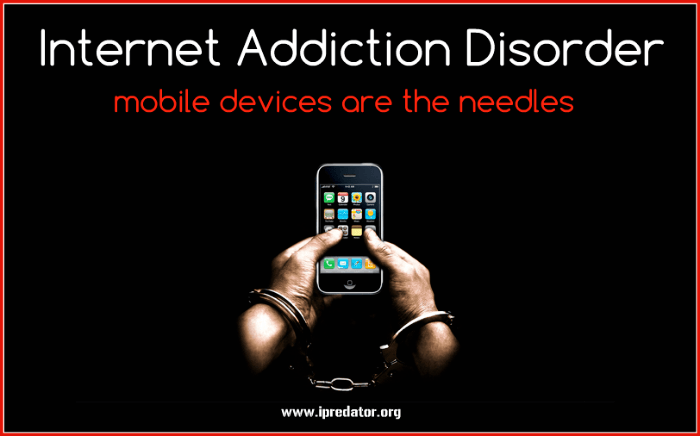
CORRECT RESPONSES TO ALL IARC ITEMS ARE NO, DISAGREE, FALSE OR DOES NOT APPLY.
ADD +1 FOR EACH “NO” RESPONSE AND +1 FOR EACH “DOES NOT APPLY” RESPONSE. UPON COMPLETION, TALLY THESE TWO AMOUNTS AND COMPARE YOUR FINAL SCORE TO THE SCORING KEY BELOW.
INTERNET ADDICTION RISK CHECKLIST
Subjects Gender: Male__ Female__ N/A__
Age: Teen (18-20) __Young Adult (21-25) __Adult (26+) __Business__
Average Daily Online Activity: 0-1 Hour__1-3 Hours__3-5 Hours__5+ Hours__
A. Y__ (Yes, Agree, True)
B. N__ (No, Disagree, False)
C. IDK__ (I Do Not Know, I Did Not Know, I Am Unsure)
D. DNA__ (Does Not Apply, Not Applicable, Not Relevant)
COGNITIVE
- 1. You or the subject use thoughts of ICT to block out negative feelings about life.
- 2. You or the subject thinks more time online helps when feeling negative or frustrated.
- 3. You or the subject thinks habitually interacting with a group of online contacts never met in person is not a problem.
- 4. You or the subject habitually thinks about future ICT usage.
- 5. You or the subject thinks habitually using private codes or lingo with a select group of online contacts is not a problem.
- 6. You or the subject are having concentration difficulties, memory problems and time awareness distortions due to ICT usage.
- 7. You or the subject thinks quickly deleting online information if friends, loved ones or coworkers unexpectedly walks in is not a problem.
- 8. You or the subject thinks habitually posting online information, considered by others, as cryptic or jumbled is not a problem.
- 9. You or the subject thinks about the negative consequences being caused by internet addiction but minimize the consequences.
- 10. You or the subject thinks habitually posting derogatory online information about others is not a problem.
- 11. You or the subject thinks about internet addiction but does not seek help or consult with a loved one.
- 12. You or the subject thinks habitually posting online information about others, without their consent or knowledge, is not a problem.
- 13. You or the subject thinks habitually using a private online identity that is not for internet safety purposes is not a problem.
- 14. You or the subject thinks habitually responding to contacts from online strangers is not a problem.
- 15. You or the subject thinks habitually discussing with online contacts violent, prejudicial or hate based topics is not a problem.
- 16. You or the subject have thoughts of a boring life existence if online activities are stopped, curtailed or hampered in any way other than complete freedom.
- 17. You or the subject thinks habitually participating in anonymous video or instant messaging chat room sites is not a problem.
- 18. You or the subject thinks ignoring important responsibilities because of ICT usage is not a problem.
- 19. You or the subject thinks hiding compulsive ICT usage from friends and relatives is not a problem.
- 20. You or the subject thinks about ways to deceive friends, family members or co-workers about the actual cost and time of ICT involvement.
- 21. You or the subject habitually thinks about ways to use ICT for longer periods without considering the consequences.
- 22. You or the subject thinks neglecting academic, work or household chores to spend more time online is not a problem.
- 23. You or the subject thinks being online is preferable to intimacy with a significant other.
- 24. You or the subject thinks forming new relationships with online users is just as important as establishing offline relationships.
- 25. You or the subject thinks, when others complain about the amount of time spent online, it is not a problem or they are exaggerating.
A. Y__ (Yes, Agree, True)
B. N__ (No, Disagree, False)
C. IDK__ (I Do Not Know, I Did Not Know, I Am Unsure)
D. DNA__ (Does Not Apply, Not Applicable, Not Relevant)
AFFECTIVE
- 26. You or the subject feels ICT usage is required to feel “normal” or satisfied.
- 27. You or the subject has feelings of guilt, shame, fear, sadness or anger when ICT is unavailable.
- 28. You or the subject feels aroused when discussing past and future ICT activities.
- 29. You or the subject becomes restless, moody, depressed or irritable when attempting to curtail ICT usage.
- 30. You or the subject has feelings of guilt, shame, anxiety or depression from habitual ICT usage.
- 31. You or the subject feels frustrated, angry, tense & depressed when ICT is inaccessible.
- 32. You or the subject feels secure when engaging in ICT usage at intervals that are more frequent.
- 33. You or the subject feels a loss of control related to habitual ICT usage.
- 34. You or the subject has “craving” feelings when ICT is not accessible.
- 35. You or the subject feels strongly about needing to engage in ICT activities.
- 36. You or the subject feels a sense of loss when having to stop ICT usage.
- 37. You or the subject experience anxiety feelings when ICT becomes inoperable.
- 38. You or the subject feels ICT usage will always alleviate negative emotions.
- 39. You or the subject uses the internet to escape or relieve a depressed mood (e.g., feelings of helplessness, guilt, anxiety).
- 40. You or the subject feels anxiety, irritability, boredom or depression after several days without internet activity.
- 41. You or the subject feels less depressed, moody or nervous immediately after getting back online.
- 42. You or the subject feels aroused when fantasizing about being online.
- 43. You or the subject feels joyful anticipation and excitement just prior to going online.
- 44. You or the subject feels annoyed if bothered online.
- 45. You or the subject secretly fears that life without the Internet would be empty, and joyless.
- 46. You or the subject feels passionate about a religious, political or societal movement and online activities take priority over responsibilities.
- 47. You or the subject feels passionate about a religious, political or societal movement and spend increasingly greater amounts of time online.
- 48. You or the subject feels hesitant to discuss family, career or offline information to online contacts that could lead to identification.
- 49. You or the subject feels pride and satisfaction using ICT to obtain people’s identity that was previously unknown.
- 50. You or the subject does not feel embarrassed contacting others online without an obvious reason or obvious connection.
A. Y__ (Yes, Agree, True)
B. N__ (No, Disagree, False)
C. IDK__ (I Do Not Know, I Did Not Know, I Am Unsure)
D. DNA__ (Does Not Apply, Not Applicable, Not Relevant)
BEHAVIORAL
- 51. You or the subject has increasingly neglected basic hygiene due to ICT usage.
- 52. You are the subject habitually spend more time online than planned.
- 53. You or the subject engages in high-risk ICT activities.
- 54. You or the subject are less productive at school or work due to ICT usage.
- 55. You or the subject repeatedly use ICT as a replacement for relationships.
- 56. You or the subject are isolated from friends and loved ones more to spend time using ICT.
- 57. You or the subject is spending more time socializing using ICT than offline.
- 58. You or the subject has been reprimanded at work, school or at home due to ICT usage.
- 59. You or the subject have attempted and failed to reduce ICT usage.
- 60. You or the subject employs deception & dishonesty to hide compulsive ICT usage.
- 61. You or the subject have experienced a loss of sleep, weight loss or gain, backaches, headaches or other physical problems due to ICT usage.
- 62. You or the subject has recently lost a close relationship, job, academic or career opportunity due to ICT usage.
- 63. You or the subject have a pattern of ICT tolerance by needing better ICT, more ICT software or more hours of ICT use.
- 64. You or the subject have actively hid compulsive internet behaviors from friends and loved ones.
- 65. You or the subject has relapsed defined as being unable to fulfill ICT control goals.
- 66. You or the subject has habitually sought new relationships with fellow ICT users.
- 67. You or the subject has prior histories of abuse with ICT, mood/mind altering chemicals or behavioral addictions.
- 68. You or the subject has a past or present history of mood disorders or other mental illness.
- 69. You or the subject habitually checks emails or social media profiles daily.
- 70. You or the subject has persistently attempted to engage peers in controlling ICT usage.
- 71. You or the subject has friends or family who complain about ICT usage and/or themes of ICT content investigated.
- 72. You or the subject has become easily agitated when ICT usage is interrupted by family or friends.
- 73. You or the subject disregards the known harmful consequences from compulsive internet usage.
- 74. You or the subject continues to use the internet despite knowledge of a persistent physical or psychological problem.
- 75. You or the subject is spending less time practicing internet safety.
A. Y__ (Yes, Agree, True)
B. N__ (No, Disagree, False)
C. IDK__ (I Do Not Know, I Did Not Know, I Am Unsure)
D. DNA__ (Does Not Apply, Not Applicable, Not Relevant)
PERCEPTUAL
- 76. You or the subject has been confronted being in denial of internet addiction.
- 77. You or the subject has noticed a loss of interest in hobbies and other activities.
- 78. You or the subject has noticed a loss of interest in friends and significant others.
- 79. You or the subject senses becoming more defensive when confronted about ICT usage.
- 80. You or the subject admits ICT usage produces a consistent sense of euphoria, anticipation or excitement.
- 81. You or the subject experiences an internal desire to increase ICT usage time.
- 82. You or the subject experiences a sense of achievement, accomplishment or meaningful purpose from ICT usage.
- 83. You or the subject view ICT usage as therapeutic to alleviate feelings of helplessness, guilt, anxiety and depression.
- 84. You or the subject believes ICT usage can be effectively used to control moods. (positive and negative)
- 85. You or the subject believes psychological or physiological withdrawal sensations, when ICT is inaccessible, does not indicate an internet addiction.
- 86. Prefers the excitement attributed to ICT as opposed to intimacy of a partner.
- 87. You or the subject views habitually impersonating others online or using a fake identity is not problematic.
- 88. You or the subject believes having multiple usernames with different profiles, not explained by internet safety practices, is an acceptable practice.
- 89. You or the subject believes secretly visiting websites, blogs or social networking sites is not problematic.
- 90. You or the subject views spending substantial amounts of time online in private without rational reason is not a problem.
- 91. You or the subject views spending substantial amounts of time using researching what others have posted that is not related to online reputation monitoring is normal.
- 92. You or the subject believes exaggerating online about erroneous events and events not crucial to one’s livelihood is not a problem.
- 93. You or the subject sense others may be getting upset from contacting them multiple times a day without expressed invitation.
- 94. You or the subject attempts to add “buddies” or “friends” to social media lists, despite not personally knowing the online recipients and view the actions as acceptable.
- 95. You or the subject habitually asks others for personal information that has little merit for obtaining and believe it is not rude.
- 96. You or the subject habitually fantasize about using ICT to contact people’s family, friends or colleagues, despite having no clear connection to them.
- 97. You or the subject is experiencing an increase in internet use is required to achieve satisfaction.
- 98. You or the subject believes having a negative experience when unable to access the internet is natural.
- 99. If you or the subject has a history of mental illness, it is not important to be cautious with habitual online activities.
- 100. You or the subject perceives internet addiction and problematic internet is a fictitious problem made up by the media and healthcare professionals.
A. Y__ (Yes, Agree, True)
B. N__ (No, Disagree, False)
C. IDK__ (I Do Not Know, I Did Not Know, I Am Unsure)
D. DNA__ (Does Not Apply, Not Applicable, Not Relevant)
Cyber Sex Fixated
- 1. You or the subject spends increasing amounts of time focused on sexually themed information online.
- 2. You or the subject is involved in multiple online romantic or sexual affairs that is kept secret.
- 3. You or the subject has failed to cut back on habitually visiting online pornography websites and/or sexually themed adult dating sites.
- 4. Sexually themed online activities have interfered with you or the subject’s work, school or household responsibilities.
- 5. Sexually themed online activities have interfered with you or the subject’s intimate partnerships.
- 6. You or the subject habitually collects internet pornographic images and videos.
- 7. You or the subject fantasizes about online sexual acts or experiences, which would be illegal if carried out or implemented.
- 8. Has your social or family interactive time decreased due to online fantasy involvement?
- 9. You or the subject is secretive and deceptive about the amount of time spent online engaged in sexually themed activities.
- 10. You or the subject becomes agitated, irritable or anxious when unable to access online sexually themed information.
A. Y__ (Yes, Agree, True)
B. N__ (No, Disagree, False)
C. IDK__ (I Do Not Know, I Did Not Know, I Am Unsure)
D. DNA__ (Does Not Apply, Not Applicable, Not Relevant)
Cyber Relationship Fixated
- 1. You or the subject habitually engages with romantic partners met online, while being involved in a marital or other primary relationship.
- 2. You or the subject increasingly feels lonesome when not able to access the internet to contact online relationships.
- 3. You or the subject has become habitually focused upon online involvement to engage with partners, family or friends.
- 4. You or the subject spends significant amounts of time in chat rooms and other online venues driven by the fantasy of locating an intimate partner.
- 5. You or the subject are increasingly preoccupied with using the internet to find online intimate or sexual partners.
- 6. You or the subject is becoming more enveloped by thoughts of meeting a special person online.
- 7. You or the subject views online relationships as more rewarding than offline relationships.
- 8. You or the subject spends all available online time engaged in social networking, chat rooms and/or messaging new or hopeful online contacts.
- 9. You or the subject increasingly engages in fantasy about an abstract or newly introduced online contact
- 10. You or the subject habitually believes a new online contact’s attributes, geographic location or stories despite having information that may suggest otherwise.
A. Y__ (Yes, Agree, True)
B. N__ (No, Disagree, False)
C. IDK__ (I Do Not Know, I Did Not Know, I Am Unsure)
D. DNA__ (Does Not Apply, Not Applicable, Not Relevant)
Internet Gaming & Online Commerce Fixated
- 1. You or the subject has recently been unable to pay bills due to money loss from online gambling.
- 2. You or the subject has recently lost a significant amount of funds from online stock trading that was previously allocated to other fiscal responsibilities.
- 3. You or the subject has become compulsive spending large periods at online auction sites bidding on non-essential products.
- 4. You or the subject has been confronted by a loved about obsessively playing off-line computer games.
- resulting in financial and job-related problems.
- 5. You or the subject has been increasingly isolating from friends and family to play online games or online gambling.
- 6. You or the subject has been confronted by friends or family spending prolonged periods participating in online fantasy games.
- 7. You or the subject are noticeably playing online games for increasing amounts of time
- 8. You or the subject habitually thinks about gaming, gambling or online shopping during other offline activities.
- 9. You or the subject habitually fantasizes about gaming, gambling or online shopping to escape from life problems or feelings of anxiety and depression.
- 10. You or the subject habitually lies to friends and family to conceal gaming, gambling or online shopping.
A. Y__ (Yes, Agree, True)
B. N__ (No, Disagree, False)
C. IDK__ (I Do Not Know, I Did Not Know, I Am Unsure)
D. DNA__ (Does Not Apply, Not Applicable, Not Relevant)
Information Implosion Fixated
- 1. You or the subject habitually thinks about wanting to be online to explore different subjects.
- 2. You or the subject habitually searches online looking for information and topics that are not of genuine interest.
- 3. You or the subject receives a flood of online information daily and feels pressured to open, answer or scan over all material.
- 4. You or the subject become overwhelmed by the information available when completing work tasks and feel pressured to review all online sources.
- 5. You or the subject habitually attempt to check all incoming emails fearing that deleting them before reading will lead to negative consequences.
- 6. You or the subject habitually takes prolonged periods to return to suspended work and/or tasks than expected.
- 7. You or the subject experiences intermittent memory loss and/or difficulty concentrating on work, school or home responsibilities due to habitual online usage.
- 8. You or the subject prefers spending time online rather than with offline contacts engaging in offline activities.
- 9. You or the subject experiences regular time distortion events due to online activities.
- 10. You or the subject feels immediately compelled to access the internet when an unknown answer to a personal or social question is posed for speculation.
A. Y__ (Yes, Agree, True)
B. N__ (No, Disagree, False)
C. IDK__ (I Do Not Know, I Did Not Know, I Am Unsure)
D. DNA__ (Does Not Apply, Not Applicable, Not Relevant)
Dark Side Fixated
- 1. You or the subject spends most of your time online searching for information themed with violence, obscenity or macabre.
- 2. You or the subject habitually spend time searching for bizarre or grotesque information online to share with others.
- 3. You or the subject finds little interest in benevolent and positive information online.
- 4. You or the subject fantasizes when online and offline about engaging in violent, deviant and/or bizarre activities.
- 5. You or the subject spends copious amounts of time designing and creating online personas, usernames and profiles that are evil, death, darkness, deviant or violence themed.
- 6. You or the subject spends increasing periods engaged in fantasizing about meeting an intimate online contact that shares the same dark interests.
- 7. You or the subject requires dark themed content, online conversations and multimedia to feel gratification.
- 8. You or the subject increasingly attempts to dress, behave and mimic in a manner believed to be in line with created usernames, profiles and online identities.
- 9. You or the subject is increasingly isolating from friends and family to spend more time online seeking out others who share dark themes.
- 10. You or the subject increasingly engages in cyber harassment or cyber stalking activities attempting to control online users and inspire fear.
Yes Answers___No Answers___I Do Not Know___Does Not Apply___
No Answers___ + Does Not Apply___ = IARC Score___
CORRECT RESPONSES TO ALL IARC ITEMS ARE NO, DISAGREE, FALSE OR DOES NOT APPLY.
ADD +1 FOR EACH “NO” RESPONSE AND +1 FOR EACH “DOES NOT APPLY” RESPONSE. UPON COMPLETION, TALLY THESE TWO AMOUNTS AND COMPARE YOUR FINAL SCORE TO THE SCORING KEY BELOW.
Note: Just like all the Information Age tools, it is recommended to take the IARC on a quarterly basis if Internet Addiction issues are a concern. The goal for healthy Information and Communications Technology (ICT) functioning is to score a 90 or higher. “IDK” & wrong responses should be addressed immediately with a structured plan of action. Although obtaining a score of 90 or higher indicates a minimal probability of suffering a pathological Internet Use Disorder (aka Internet Addiction,) it is still crucial to remain vigilant in taking note of ICT usage becoming a compulsive dependency. As Information and Communications Technology continues to expand, it will become increasingly important to manage and monitor online activities to not convert to a psychopathological condition.
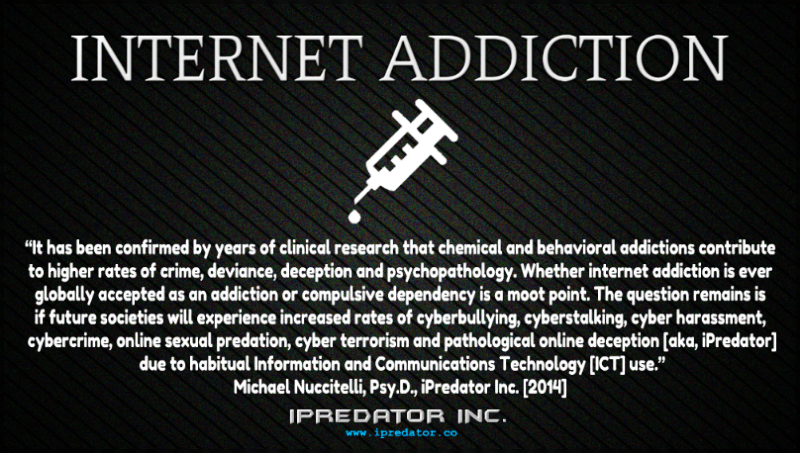
SCORING KEY
Score: (1-10)
Category: Guaranteed Internet Addiction and Extremely Vulnerable.
Risk Potential: Alarmingly High.
Present and/or Future Internet Addiction Consequences: Certain.
Intervention Plan: Professional Consultation Highly Advised.
Level of Urgency: Urgent Attention Required.
Score: (11-29)
Category: Prime Internet Addiction and Extremely Vulnerable.
Risk Potential: High.
Present and/or Future Internet Addiction Consequences: Almost Certain.
Intervention Plan: Professional Consultation Highly Advised.
Level of Urgency: Immediate Attention Required.
Score: (30-39)
Category: Probable Internet Addiction and Extremely Vulnerable.
Risk Potential: Moderately High.
Present and/or Future Internet Addiction Consequences: Involvement Likely.
Intervention Plan: Professional Consultation Highly Advised.
Level of Urgency: Immediate Attention Strongly Recommended.
Score: (40-55)
Category: Likely Internet Addiction and Moderate Vulnerability.
Risk Potential: Moderate.
Present and/or Future Internet Addiction Consequences: Involvement Suspected.
Intervention Plan: Create and Implement an Internet Addiction Prevention Plan.
Level of Urgency: Immediate Attention Recommended.
Score: (56-78)
Category: Possible Internet Addiction and Moderate Vulnerability.
Risk Potential: Moderate.
Present and/or Future Internet Addiction Consequences: Involvement Possible.
Intervention Plan: Increase Internet Addiction Prevention Strategies.
Level of Urgency: Immediate Attention Suggested.
Score: (79-89)
Category: Skilled Internet Addiction Prevention and Low Vulnerability.
Risk Potential: Mild.
Present and/or Future Internet Addiction Consequences: Possible, but Unlikely.
Intervention Plan: Continue Internet Addiction Prevention Strategies.
Level of Urgency: Not Urgent, Important to Address if Score Below 80.
Score: (90-100)
Category: Advanced Internet Addiction Prevention Skills and Minimal Vulnerability.
Risk Potential: Minimal.
Present and/or Future Internet Addiction Consequences: Unlikely.
Intervention & Education Plan: Consider Educating Others.
Level of Urgency: 0%, All Internet Addiction Prevention Activated & Addressed.
Michael Nuccitelli, Psy.D.
Michael Nuccitelli, Psy.D. is a NYS licensed psychologist, cyberpsychology researcher and online safety educator. In 2009, Dr. Nuccitelli finalized his dark side of cyberspace concept called iPredator. Since 2010, he has advised those seeking information about cyberbullying, cyberstalking, cybercriminal minds, internet addiction and his Dark Psychology concept. By day Dr. Nuccitelli is a practicing psychologist, clinical supervisor and owner of MN Psychological Services, PLLC. After work and on the weekends, he volunteers helping online users who have been cyber-attacked. Dr. Nuccitelli’s is always available to interested parties and the media at no cost. This website and everything created by Dr. Nuccitelli is educational, free and public domain.
